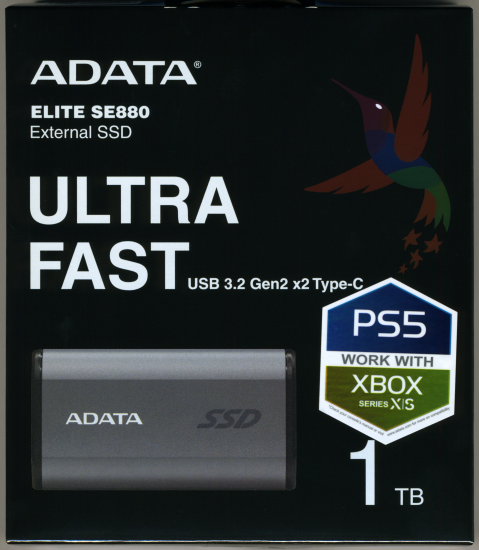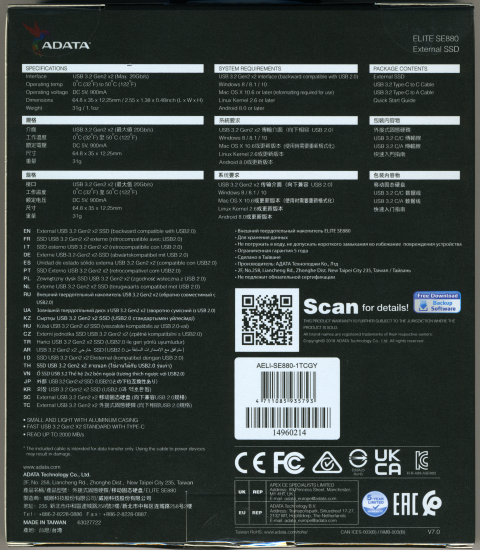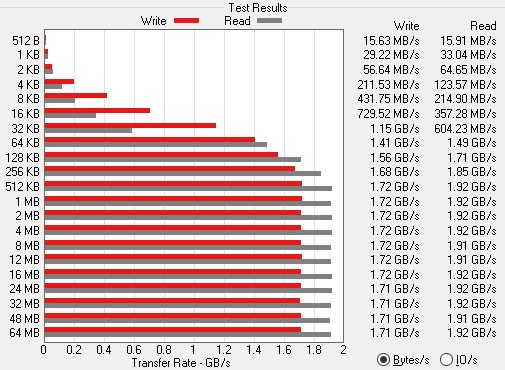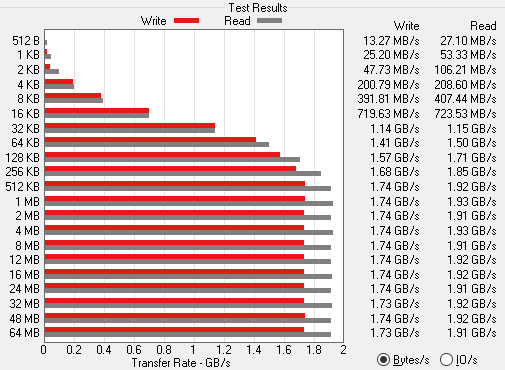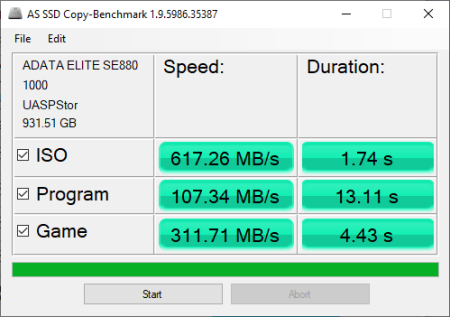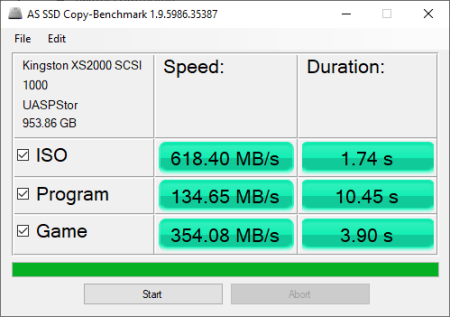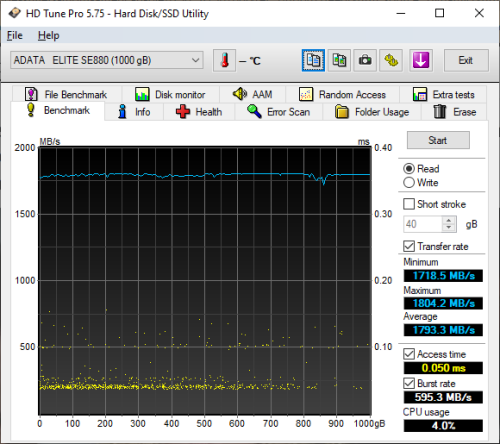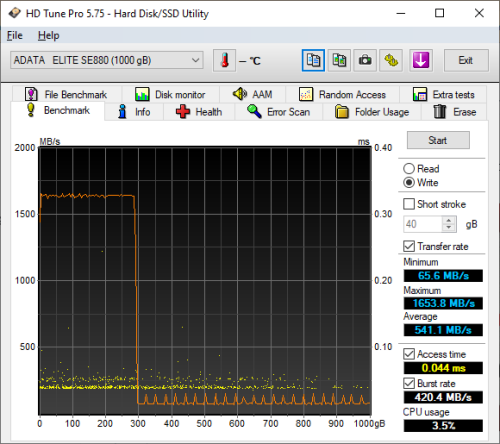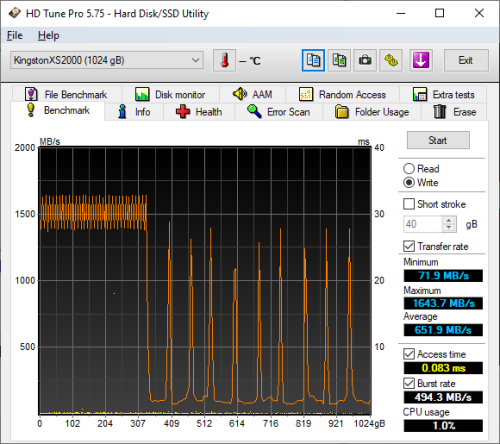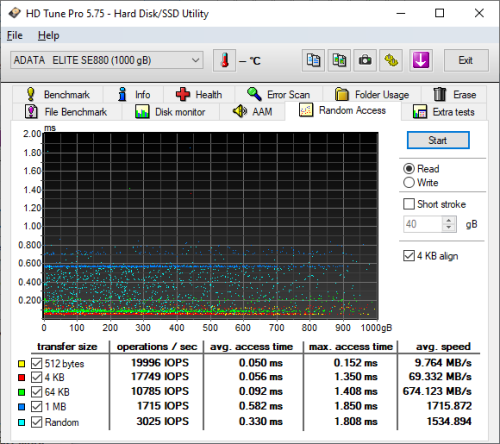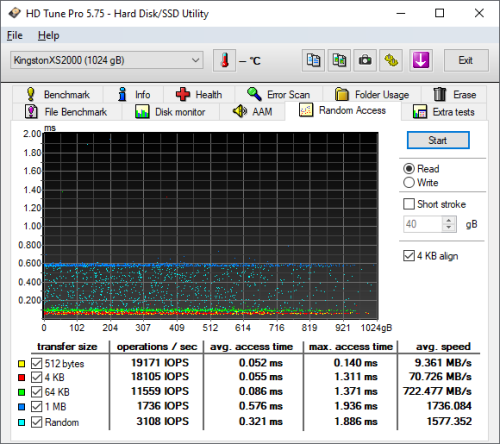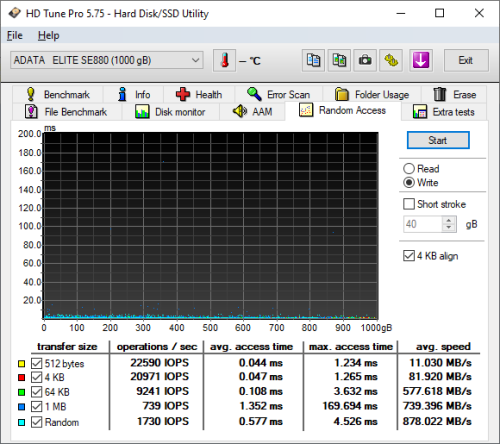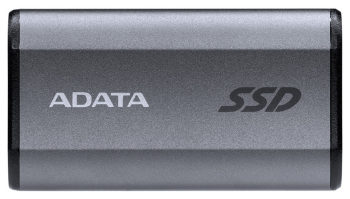

Model: ADATA Elite SE880 1TB External Solid State Drive
Manufacturer: ADATA Technology
Provided By: ADATA Technology (USA)
ADATA Technology is one of the world's leading manufacturers of high performance memory modules and data storage solutions. Founded in 2001 with a staff of 20, this Taiwanese company set itself apart from the competition early on thanks to its professionalism, industry know-how and eye-catching product designs. Today, ADATA continues to lead the way through constant innovation and development of products that exceed customer expectations. Backed by technical expertise, state-of-the-art manufacturing facilities and premium customer service, ADATA currently offers a variety of products including DRAM modules, USB flash drives, memory cards, solid state drives and portable hard drives.
Earlier this year, ADATA launched its latest external SSD, the Elite SE880. This pocket-sized, portable drive is powered by Silicon Motion's SM2320 controller and is available with up to 1TB of 3D TLC NAND flash. The Elite SE880 supports USB 3.2 Gen2 x2, is equipped with a Type-C port and is capable of delivering transmission speeds of 20 Gb/s. This is two times faster than USB 3.2 Gen 2x1 and four times faster than USB 3.2 Gen 1x1. This allows the drive to transfer data at speeds up to 2,000 MB/s, which is roughly twenty times faster than ordinary external hard drives. To top it all off, the Elite SE880 works with Windows, Mac, Linux and Android as well as many of the latest gaming consoles and is covered by a 5-year warranty.
The Elite SE880 is available in 500GB and 1TB capacities. For this review, ADATA sent us the 1TB version of the drive which is capable of reading and writing at up to 2,000 MB/s.
| ADATA Elite SE880 1TB External Solid State Drive | |||||||||||||||||||||||
General Specifications
Performance
Environmental
Dimensions and Weight
Other Features
|
Needless to say, this is only a taste of what the Elite SE880 has to offer. To give you an idea of what to expect, we'll take a closer look at ADATA's new portable SSD and then see how well it performs. Does the Elite SE880 have what it takes? Can it deliver the value and features that we've come to expect from ADATA? Keep reading as we find out.
The Elite SE880 comes in a small black box. Along with a picture of the drive, the front advertises many of the drive's key features including its 1TB capacity, USB 3.2 Gen2 x2 Type-C interface and its compatibility with PS5 and Xbox gaming consoles. The back of the box provides a bit more information regarding the Elite SE880's specifications, system requirements and package contents. Inside, you'll find the SSD, a USB 3.2 Type-C to C cable, a USB 3.2 Type-C to A cable and a small fold out, quick start guide.
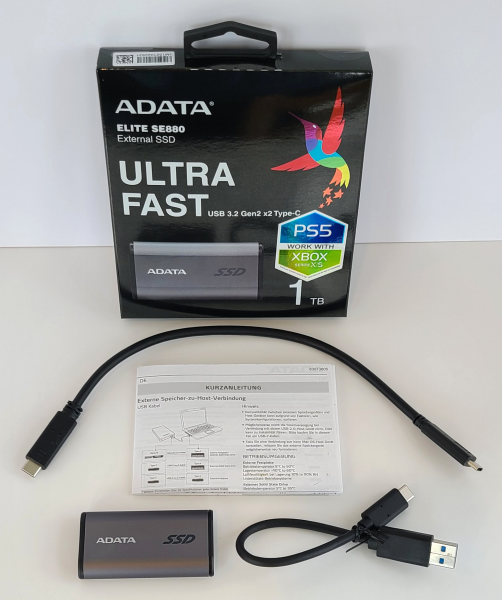
Physical Features:
The Elite SE880 is one of the smallest portable SSDs to come through the 'Labs. Measuring 64.8 x 35 x 12.25 mm and weighing a mere 31g, the drive fits comfortably in the palm of a hand as well as your pocket.
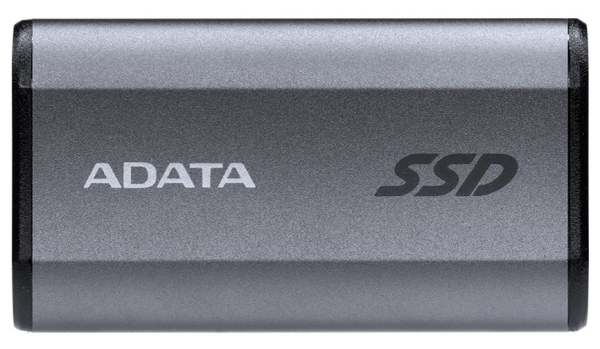
Despite being compact and lightweight, the Elite SE880 is very well constructed. While the end caps are black plastic, the body of the drive is made out of aluminum and is covered by a nice looking titanium gray finish.

The Elite SE880's USB 3.2 Gen 2x2 Type-C port is located on the end of the drive. This interface not only transfers data, but provides power for the device. To the left of the USB port there is also a small LED that lights up blue when the Elite SE880 is powered on and will flash when transferring data.

If you were to crack the Elite SE880 open, you'd find Silicon Motion's SM2320 controller. Designed for use in portable SSDs, this DRAM-less controller solution features an on-chip USB 3.2 Gen 2 interface as well as four NAND flash channels. The SM2320 also includes Silicon Motion's NANDXtend ECC end-to-end data path protection and supports up to 4TB of capacity using the latest TLC and QLC NAND.
The test system used in this review is equipped with an AMD Ryzen 5 3700x CPU, MSI B550 GAMING PLUS motherboard, 16GB (8GB x 2) of Crucial Ballistix 3200 MHz DDR4 memory, Crucial P5 1TB SSD, GIGABYTE GeForce GTX 1060 WINDFORCE OC 6G graphics card and an ORICO PE20-1C USB 3.2 Gen 2×2 PCIe expansion card. For the operating system, I used the latest version of Windows 10 Pro.
To test the performance of ADATA's Elite SE880 SSD, I ran a series of benchmarks using CrystalDiskMark, HD Tach RW, ATTO Disk Benchmark, AS SSD, HD Tune Pro, Anvil's Storage Utilities, Iometer and PCMark 8. For comparison, I've also included test results from the Kingston XS2000, Crucial X8, Lexar NQ100, Samsung 870 EVO, Samsung 870 QVO, SK hynix Gold S31, ADATA Ultimate SU750, Samsung 860 QVO, Samsung 860 PRO, Crucial MX500, Plextor M8V, Crucial BX300, ADATA Ultimate SU900, Plextor S3C, Toshiba OCZ VX500, ADATA Ultimate SU800, Plextor S2C, Crucial MX300, Plextor M7V, PNY CS1311, OCZ Trion 150, PNY CS2211, Plextor M6V, Crucial BX200, OCZ Trion 100, Kingston HyperX Savage, Crucial MX200, OCZ Vector 180, Kingston BX100, Samsung 850 EVO M.2, Samsung 850 EVO mSATA, AMD Radeon R7, Silicon Power Slim S80, Samsung SSD 850 EVO, OCZ ARC 100, SanDisk Ultra II, Crucial MX100, SanDisk Extreme Pro and Samsung SSD 850 PRO.

As I mentioned earlier, the Elite SE880 is based on Silicon Motion's SM2320 controller chip. Looking at the screenshot above, you can see that it performs equally well with both incompressible (0%) and compressible (100%) data.
CrystalDiskMark 8.0.4:
First, I ran a few quick tests using CrystalDiskMark. This benchmark measures the performance of a storage device by testing its sequential and random read and write speeds. For this test, we're using the peak and real world profiles.
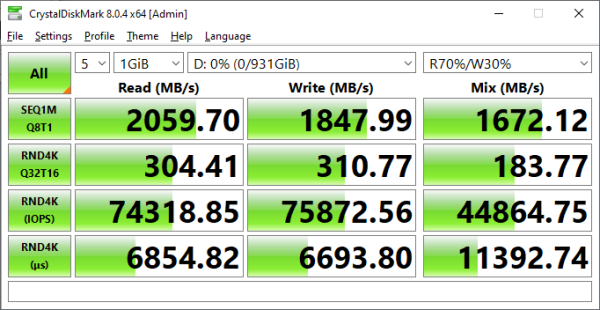
According to ADATA, the Elite SE880 is capable of reading and writing at speeds up to 2,000 MB/s when plugged into a USB 3.2 Gen 2x2 port. While the drive had no problems reaching its rated read speed, it came up a bit short in CrystalDiskMark's sequential write speed test.
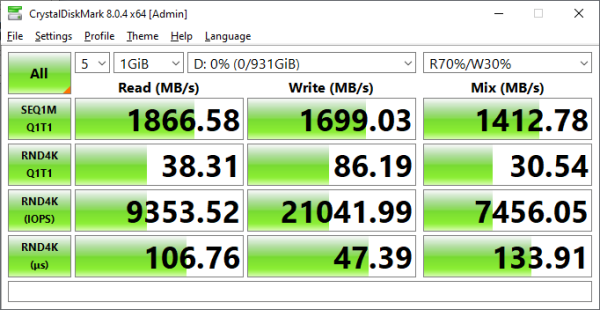
As you'd expect, the Elite SE880 wasn't quite as fast when tested with the "real world" profile, which uses a single thread and a much lower queue depth. Nevertheless, it was still able to read at 1,866 MB/s and write at more than 1,699 MB/s.
HD Tach RW 3.0.4.0:
Next, I used HD Tach to test the ADATA Elite SE880's read, write and burst speeds as well as its seek times and CPU usage.

Looking at the screenshot above, you can see that the Elite SE880 had average read and write speeds of 826.6 MB/s and 463.2 MB/s respectively, as well as a burst speed of 531.5 MB/s.
ATTO Disk Benchmark 4.01:
I also used ATTO Disk Benchmark to test the Elite SE880's sequential read and write speeds. The tests are run using blocks ranging in size from 512B to 64 MB and the total length set to 256MB.
When tested with ATTO, the Elite SE880's read speeds topped out at about 1.92 GB/s and its write speeds at 1.72 GB/s.
AS SSD:
AS SSD is a benchmark designed specifically for solid state drives. The application contains five synthetic tests which are used to determine the sequential and random read and write performance of a drive.
AS SSD also includes a copy benchmark. This test copies an ISO (two large files), program (many small files) and game (small and large files), returning the speed and duration of each.
HD Tune Pro 5.75:
Next, I ran a series of tests using HD Tune Pro. This hard disk utility measures a drive's performance by testing its sequential read and write speeds as well as its access time, burst rate and CPU usage. For this review, I'm also going to use it to benchmark the Elite SE880's random read and write speeds, random access times and the number of operations per second.
The Elite SE880 performed relatively well when benchmarked with HD Tune. The drive had average read and write speeds of 1793.3 MB/s and 541.1 MB/s, respectively.
When reading 4KB blocks, the Elite SE880 reached 17,749 IOPS and had an average speed of 69,332 MB/s. The drive was faster when writing, reaching 20,971 IOPS with an average speed of 81,920 MB/s.
Anvil's Storage Utilities:
Anvil's Storage Utilities is another benchmark designed with SSDs in mind. The standard storage benchmark measures a drive's performance by testing its transfer speeds, access times and IOPS.

Iometer:
Lastly, I ran a series of tests using Iometer. This tool can be configured to benchmark a number of things. In this case, I used it to measure the Elite SE880's read and write speeds and the number of operations per second. The tests were run using random bytes and a queue depth of 3.

The Elite SE880's performance was very similar to what we saw in our other tests. The drive was able to read at 1,973.23 MB/s and write at 1,689.01 MB/s.
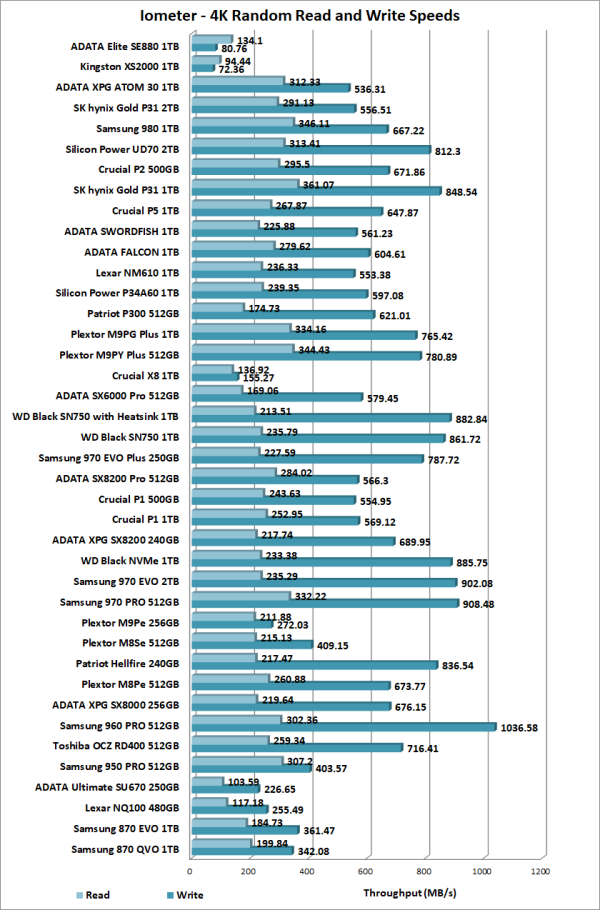
The Elite SE880 wasn't one of the faster drives we've tested when it came to random reads and writes. In our tests, the drive was able to read at 134.1 MB/s and write at 80.76 MB/s.
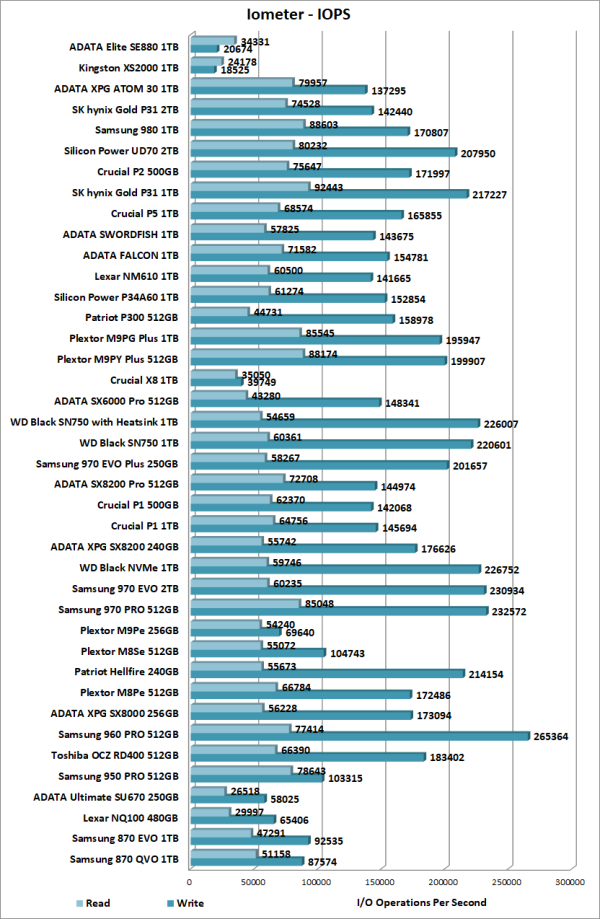
ADATA really doesn't say what the Elite SE880 is capable of in regards to IOPS. In our tests, the drive reached 34,331 random read IOPS and 20,674 random write IOPS. Increasing the queue depth had little impact on the Elite SE880's random write performance. However, with four threads and the queue depth set to 32, the drive was able to reach 69,404 random read IOPS.
Vantage PCMark 8 - Storage Test:
PCMark 8 is a complete benchmark for Windows. It includes five benchmark tests, each designed around a specific scenario. The storage benchmark measures drive performance using real-world traces recorded from Adobe Creative Suite, Microsoft Office and a selection of popular games.
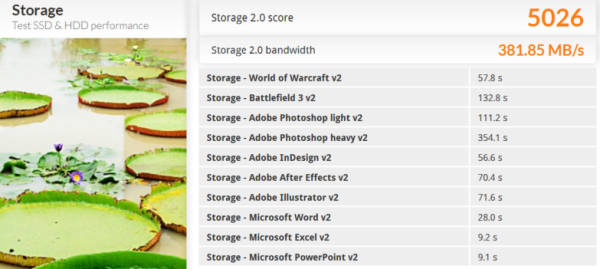
PCMark 10 - Full System Drive Benchmark:
PCMark 10's Full System Drive Benchmark uses a wide-ranging set of real-world traces from popular applications and common tasks to fully test the performance of the fastest modern drives. This benchmark produces an overall score as a measure of drive performance. Comparing devices is as simple as comparing scores. The tests also measure and report the bandwidth and average access time performance for the drive.
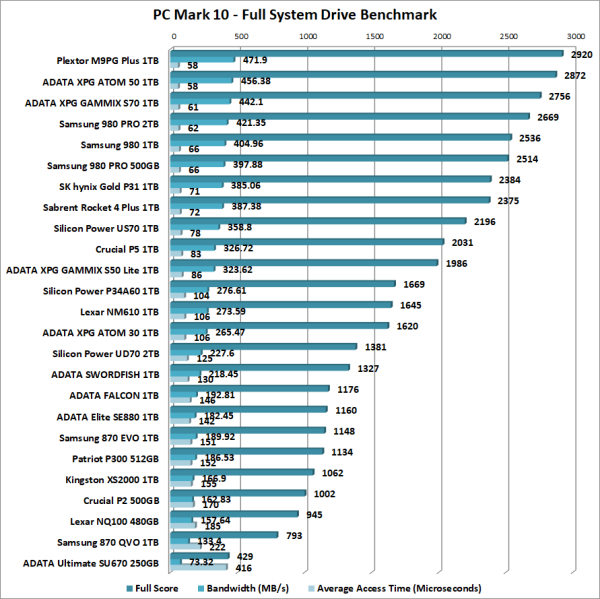
TRIM Performance:
While SSD's offer many benefits, there are some downsides to using flash memory. One of the biggest issues people run into is performance degradation. Over time, an SSD will run out of fresh blocks and will have to write over data the file system has marked as deleted. This procedure is very complicated and can slow an SSD's write speeds considerably.
To fix this problem, most manufacturers have added TRIM support to their SSDs. The TRIM command allows an operating system, such as Windows 10, to tell an SSD which data blocks are no longer in use. Using this information, the drive pro-actively erases these blocks and adds them to the free block pool.
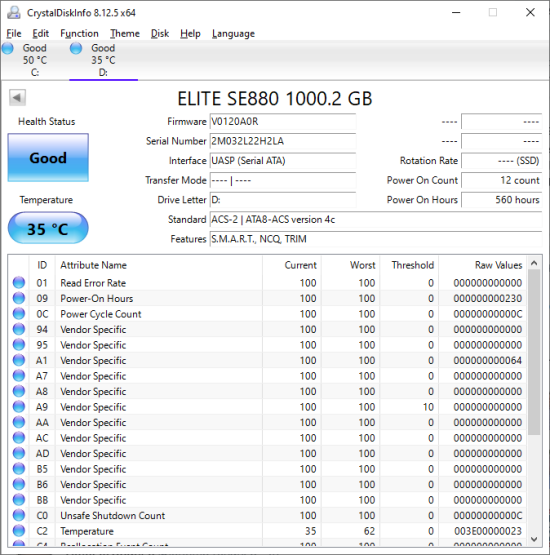
To test the Elite SE880's TRIM and garbage collection functions, I first put the drive in a "dirty" state. I used Iometer to fill 80% of the drive and then ran a random write test for 30 minutes. This had little impact on the Elite SE880's read speed. However, its average writing speed dropped to 141.79 MB/s.
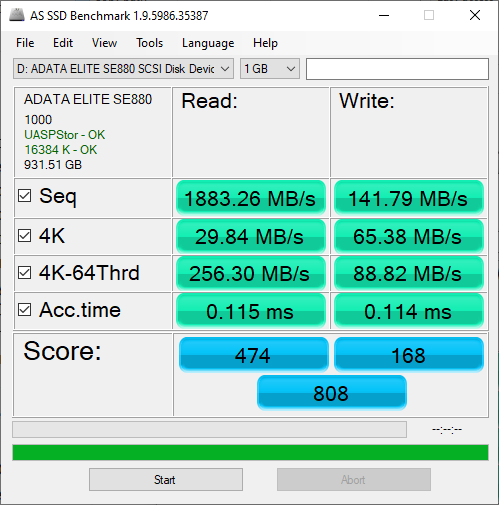
ADATA Elite SE880 - Dirty
To see how well the Elite SE880 could recover, I let the computer sit for about 30 minutes and then reran the test. The drive wasn't able to reach the factory fresh performance shown in our earlier tests. However, its sequential write speed jumped up to 1701.79 MB/s.
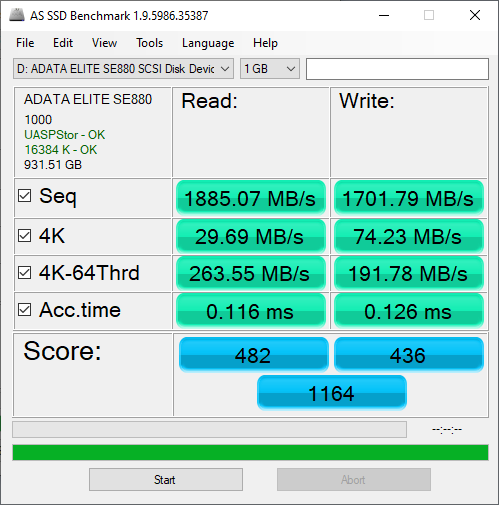
ADATA Elite SE880 - After TRIM
Unfortunately, the Elite SE880 does not support the secure erase function so I was not able to wipe the drive with Parted Magic. Instead, I did a quick wipe and format from within Windows. After this, the Elite SE880 was able to read at 1888.14 MB/s and write at 1701.48 MB/s.

ADATA Elite SE880 - Secure Erased
Final Thoughts:
ADATA's Elite SE880 portable SSD is a great addition to the company's already impressive line of flash-based storage products. Designed for content creators as well as console gamers, this lightweight, pocket-sized drive not only looks great, but is also durable enough for day to day use. The Elite SE880 is also powered by Silicon Motion's SM2320 controller and is available with up 1TB of 3D TLC NAND flash. Combine this with a USB 3.2 Gen 2x2 Type-C interface and you have a portable SSD that's capable of some pretty impressive performance. In our sequential read and write tests, the Elite SE880 was able to read at speeds as high as 2,059 MB/s and write at speeds in excess of 1,862 MB/s.
The ADATA Elite SE880 is available now in 500GB and 1TB capacities and can be purchased through retailers like Amazon for $80 and $100, respectively.

Highs:
- Available in 500GB and 1TB capacities
- Lightweight, compact design
- Silicon Motion SM2320 controller
- Equipped with 3D TLC NAND
- USB 3.2 Gen 2x2 Type-C interface
- Excellent sequential read and write speeds
- Works with Windows, Mac, Linux and Android
- Reasonably priced
- 5 year warranty
Lows:
- Mediocre random read and write performance
- Not available in higher capacities


